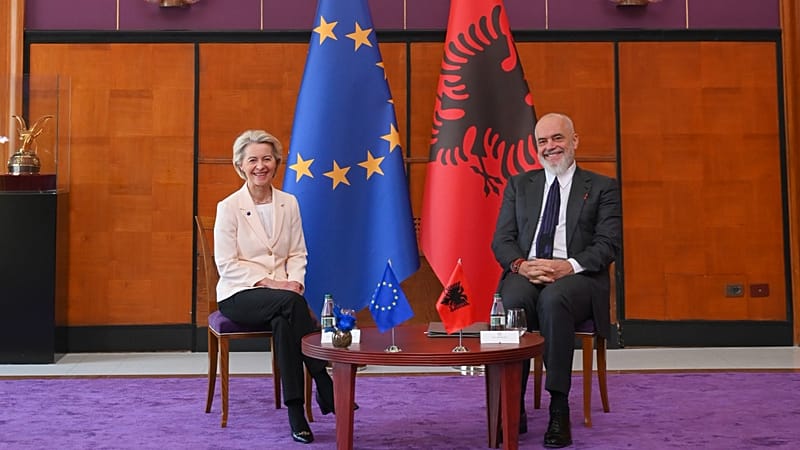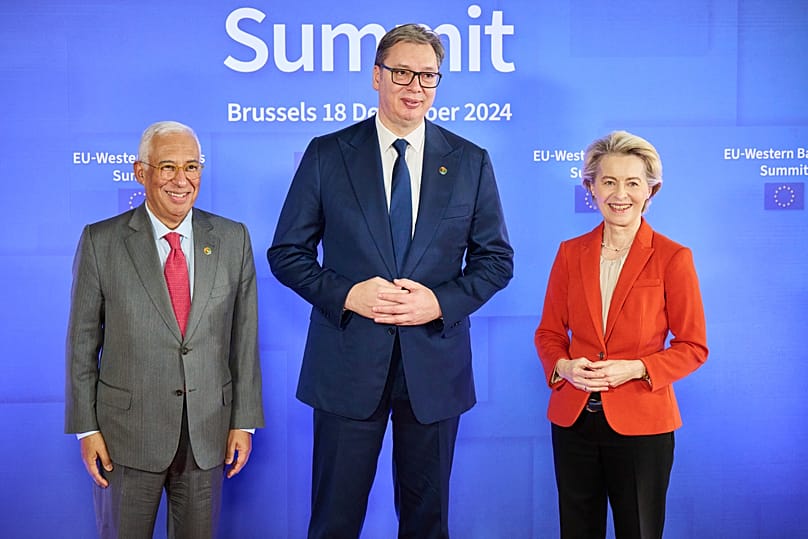Is the risk of ‘brain drain’ overlooked in the EU’s enlargement process?

The accession of new countries to the European Union risks exacerbating the shortage of critical workers in the newer member states, aggravating a brain drain.
While integrating the European Union can create business and investment opportunities, it can also fuel a massive relocation of workers looking for better salaries and jobs in richer member states once freedom of movement is established. As a result, enlargement can produce adverse second-round effects in local economies.
Croatia, which joined the EU in 2013, lost close to 400,000 residents over the last decade, according to the World Bank, which ranks the country among the top five EU nations with the most significant population decline.
In Romania, which joined in 2007, the exodus was even more extreme. One out of four Romanians are living outside the country, according to Organisation for Economic Cooperation and Development.
Complicating matters is the fact that the EU faces a severe labour shortage due to an ageing population and low fertility rates. The bloc is projectedto lose one million workers every year until 2050.
In recent years, worker mobility among the bloc's 27 member states has eased some of these shortages, but not always in equal measure, as southern and eastern European countries suffer from a brain drain of skilled workers to the detriment of their economies compared to more developed ones.
“While the exodus of (skilled) migrants from the Western Balkans has been ongoing for decades, EU accession could exacerbate this phenomenon as we saw in the previous enlargement,” Lien Jansen, PhD researcher at the KU Leuven University, told Euronews.
Schengen visa liberalisation has made mobility easier and accelerated this long-term trend, with many workers taking the opportunity to travel to the EU for seasonal work, said Jansen. "EU membership tends to intensify this process further by removing the remaining labour market barriers," she added.
Still, some experts believe the impact of joining the EU may not be as drastic in the subsequent enlargement, as some candidate countries have been stuck in the process for decades and have already experienced a wave of emigration to richer member states.
Montenegro and Albania applied for EU membership in 2008 and 2009, respectively. North Macedonia did so 22 years ago. Emigration has continued since.
The broader Balkan region has seen a constant shift in demographics, as its working-age population has declined and is projected to shrink by about 20% by 2050.
By the end of the decade, the World Bankforecasts a shortfall of more than 190,000 workers if current labour dynamics continue in the Balkan region.
A 2025 Bruegel study shows that some economic sectors in the Western Balkan countries — Albania, Bosnia and Herzegovina, Kosovo, Montenegro, North Macedonia, and Serbia —are under severe stress, particularly in healthcare, construction, and manufacturing.
“It is important to highlight that there are possible economic benefits from outmigration, including trade, foreign direct investment (FDI), and remittances from migrants' host countries,” Bruegel’s affiliate fellow Nina Vujanović told Euronews.
Bruegel’s research said. “Our study shows that this could also be the case”.
What is the EU doing about potential spillover effect?
Since Russia's full-scale invasion of Ukraine in early 2022, the EU has injected fresh momentum into the enlargement of the union as a strategic priority.
In 2023, it announced its Growth Plan for the Western Balkans, which explicitly targets economic development and socio-economic convergence. The Commission says the plan could double the region’s economies over the next decade.
“For the first time, the EU is offering a partial entry to these countries into the single market prior to their full entry into the EU based on conditions and reforms,” Vujanović said.
One of the constraining factors, however, is that developed European economies also benefit in the short term from this emigration of skilled workers from the Western Balkans, particularly in sectors facing labour shortages such as healthcare, Jansen added.
“Growth benefits from the EU entry outweigh the population losses,” Vujanović said. She added that all central and eastern European countries that have joined the bloc have experienced stronger economic convergence despite the brain drain effect.
Vujanović also explained that entry into the EU single market opens growth potential for such small economies because it allows better integration into EU supply chains.
Albania, Montenegro, North Macedonia and Moldova are part of the Single Euro Payment Area (SEPA), a condition included in the Growth Plan, meaning that cross-border payments between the EU and these countries are much faster and cheaper.
On 4 November, the European Commission is expected to present its annual evaluation of the candidate countries to assess their progress and give recommendations in areas such as rule of law, fundamental rights and justice.
What are the potential solutions?
The EU could start by recognising the brain drain effect as a joint challenge linked to enlargement in its upcoming enlargement report, said Lune Bernstein, co-author of the 2024 report ‘Navigating brain drain in the Western Balkans’.
Bernstein said that supporting measures to help retain and attract talent, such as linking funding to local employment or promoting circular migration, would also be needed.
“Candidate countries could focus on reducing the push factors that drive skilled workers away, for example, by improving the path from education to work, strengthening key sectors, and offering better working conditions,” she added.
Some countries, aware of the issue, have already started implementing reforms to incentivise the return of their citizens. In Serbia, for example, employers who hire returnees from the diaspora to work in innovation and qualified sectors receive a tax break.
Poland tried a similar mechanism in 2022, when it introduced a tax break for Poles returning to the country. So far, 25,000 people have benefited from the scheme.
To qualify, a person must be returning to Poland after spending at least three years abroad. The programme guarantees a four-year personal income tax exemption on earnings below 85,500 zloty (about €20,166).
Today


